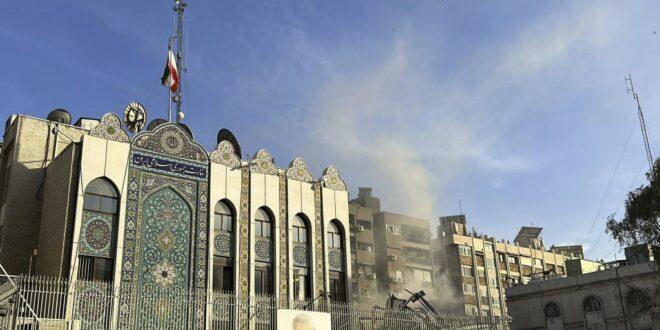Iran’s decision to rely on groups such as Hezbollah and Hamas to prosecute its war against Israel has resulted in the Israelis regularly having to retaliate with air strikes against Iranian and Hezbollah targets in Syria and Lebanon in an attempt to disrupt their terrorist infrastructure.
Since October 7, the consulate served as Tehran’s main regional command centre, helping to supervise the activities of Iran’s so-called “axis of resistance”.
[A]s recent events have indicated, Israel is not just fighting a war against the Iranian-backed Hamas terrorists who committed the terrible atrocities on October 7. It is in an existential battle for survival against the Iranian regime and its many proxies which, if left unchecked, will continue seeking to achieve their ultimate goal of destroying the Jewish state.The bombing of the Iranian consulate in Damascus, Syria was not, as the Iranians claim, simply an attack on a blameless diplomatic mission.
It was a carefully targeted strike on the headquarters of the expansive terrorist network that Tehran has established throughout the Middle East.
The real purpose of the Iranian consulate building, an adjunct of the Iranian Embassy in Damascus, was revealed when the Iranians themselves admitted that two senior commanders of the elite Quds Force of Iran’s Islamic Revolutionary Guard Corps (IRGC) were killed in the air strike, which has widely been attributed to the Israeli air force.
The Quds Force, which has direct responsibility for overseeing Iran’s global terrorist operations, reports directly to Iranian Supreme Leader Ayatollah Ali Khamenei, and was established to fulfil the ayatollahs’ ambition of exporting Iran’s Islamic revolution throughout the Muslim world.
In particular, the Quds Force is the main conduit between the IRGC and the network of proxy terrorist groups, such as Hezbollah and Hamas, that Iran uses as frontline units in its constant campaign to attack Israel.
The fact, therefore, that two senior Quds Force commanders were killed in the April 1 strike on the Iranian consulate provides conclusive proof that, far from undertaking basic consulate duties such as issuing visas, the facility was being used as a command and control centre for Iran’s terrorist activities throughout the region.
Among those who died in the attack was Brigadier General Mohammad Reza Zahedi, a senior Quds Force commander, who was responsible for coordinating Iran’s support for its Hezbollah terrorist organisation in neighbouring Lebanon, as well as Tehran’s extensive network of terror groups in Syria. His deputy, General Mohammad Hadi Hajriahimi, was also killed in the attack.
Hezbollah forces, which form part of Iran’s so-called “axis of resistance” against Israel, have been regularly initiating attacks against northern Israel since Iranian-backed Hamas terrorists launched their deadly invasion of Israel on October 7. As a result, large areas of northern Israel have been left desolate as tens of thousands of Israelis have been forced to flee their homes.
Iran’s decision to rely on groups such as Hezbollah and Hamas to prosecute its war against Israel has resulted in the Israelis regularly having to retaliate with air strikes against Iranian and Hezbollah targets in Syria and Lebanon in an attempt to disrupt their terrorist infrastructure.
In particular, the Israel Defence Forces (IDF) have targeted Quds Force commanders who play a key role in supporting Hezbollah’s terrorist activities.
In December, Israeli warplanes were reported to have carried out the assassination of Razi Mousavi, the then head of Quds Force operations in Syria.
Mousavi’s assassination was the highest-profile killing of a senior Quds Force commander since the Trump administration’s liquidation of Qasem Soleimani, the charismatic head of the Quds Force who was killed by a US drone strike in Baghdad, Iraq in January 2020.
It was under Soleimani’s supervision, moreover, that the Iranian consulate in Damascus developed into a key headquarters for Iran’s terrorist network throughout the Middle East.
The consulate’s role in supporting Tehran’s terrorist activities dates back to the early 1980s, when Iran first established Hezbollah in southern Lebanon.
According to Western intelligence sources, it was from this building that Iran oversaw the Lebanon hostage crisis in the mid-1980s, which resulted in scores of American, British and French hostages being taken captive by Islamist terrorists.
Imad Mughniyeh, the Lebanese terrorist mastermind behind a wave of deadly truck bombings including against the US Embassy and US Marines compound in Beirut in 1983, was assassinated by a team of Israeli Mossad agents in 2008 shortly after driving out of the compound where the consulate was located.
More recently, it was used as the nerve centre for Iran’s efforts to keep the regime of Syrian President Bashar al-Assad in power during Syria’s brutal civil war.
Since October 7, the consulate served as Tehran’s main regional command centre, helping to supervise the activities of Iran’s so-called “axis of resistance”.
Zahedi, who died in the April 1 attack on the consulate, had fulfilled the same liaison role previously undertaken by Mughniyeh in coordinating links between Iran and Hezbollah.
Given the consulate’s long history of involvement in running Iran’s terror network, Israel would be perfectly justified in seeking to attack it, especially given its role in supervising the constant barrages of missiles Hezbollah has been launching against northern Israel.
For, as recent events have indicated, Israel is not just fighting a war against the Iranian-backed Hamas terrorists who committed the terrible atrocities on October 7. It is in an existential battle for survival against the Iranian regime and its many proxies which, if left unchecked, will continue seeking to achieve their ultimate goal of destroying the Jewish state.
 Eurasia Press & News
Eurasia Press & News


